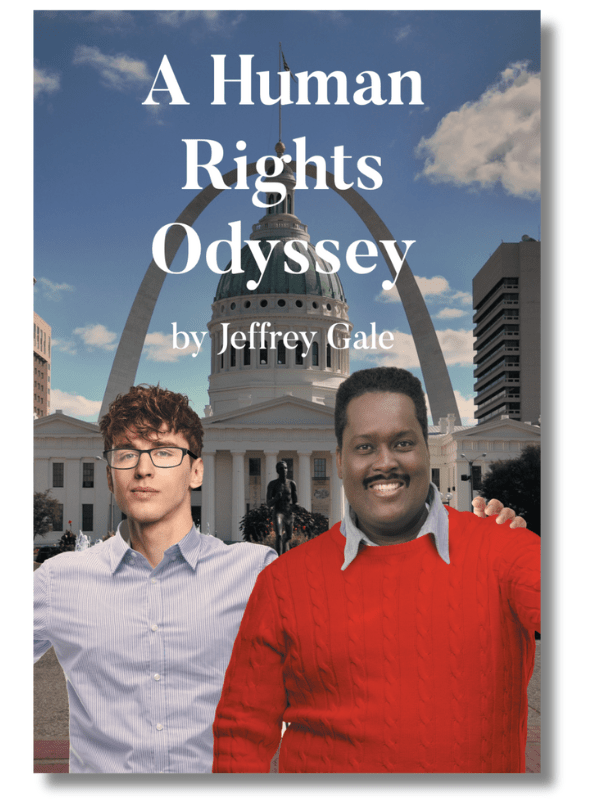A Human Rights Odyssey
by Jeffrey Gale
Genre: Literary Fiction / Religious Fiction
ISBN: 9798893157772
Print Length: 494 pages
Publisher: Page Publishing
Reviewed by Lauren Hayataka
A legacy that shows reconciliation is never passive—it must be pursued
Jeffrey Gale’s A Human Rights Odyssey: From Dreams Deferred to Reconciliation continues the life story of Rabbi Isaac Levin, first introduced in The Secret of Redemption, with the same intellectual rigor and emotional weight—but with a new, urgent tenderness that makes this sequel feel both more intimate and more expansive.
Opening in 2014, the novel situates Isaac as a rabbi in northern Manhattan, where his synagogue, Rodef Tzedek, has become a beacon of inclusivity. Yet even in this celebrated city, Isaac knows that prejudice still festers.
The book begins in the shadow of two devastating events: the police shooting of Michael Brown in Ferguson, Missouri, and the murder of Indigenous teenager Tina Fontaine in Winnipeg. These tragedies spark a deep reflection in Isaac, one that takes him—and the reader—on a sweeping journey through decades of activism, spiritual leadership, and the unrelenting pursuit of equality. From the segregated suburbs of 1960s St. Louis to Soviet refusenik apartments, Canadian prairies, penitentiary chapels, post-9/11 New York, and back again, the scope is astonishing.
Like its predecessor, A Human Rights Odyssey examines the complex role of religious institutions during times of social crisis. Yet Gale avoids simple binaries. The novel honors Jewish prophetic tradition while also making space for agnosticism, doubt, and interfaith collaboration. Some of the book’s most stirring passages come from Isaac’s mentors—rabbis, cousins, professors, and even prison inmates—who remind him that “true religion is about fighting for justice outside of the hallowed walls.”
That said, this is not a novel of unrelenting heaviness. Gale breaks the tension with small, grounding details: anxious preparations for an interfaith Thanksgiving program, the youthful awe of hearing West Side Story for the first time, and a black cat named Bad Bob beloved by inmates. These flashes of humanity let the work breathe, and remind the reader that the work of repair is sustained not only by courage but also by tenderness, by the small joys that keep us moving forward.
Gale’s prose is deliberate and thoughtful, often resembling a rabbinic sermon in its cadence. Each chapter feels like a lesson wrapped in a story, touching on topics from the legacy of West Side Story to the shadow of the Holocaust, from the fight for prison reform to the heartbreak of losing a lifelong friend. One of the most affecting threads is Isaac’s decades-long friendship with Jeremy, an African American classmate he once misjudged. Their bond—tested by racism, time, and tragedy—becomes one of the novel’s most moving through-lines.
The novel is unapologetically didactic at times, offering a near-encyclopedic tour through civil rights struggles, Jewish history, Indigenous suffering, and modern American inequities. And yet it rarely drifts into sermonizing. Gale’s strength lies in showing how these historical forces shape Isaac’s lived experience—whether he’s preparing a Cree girl for her bat mitzvah, standing up to the Michigan Department of Corrections, or revisiting the segregated classrooms of his youth.
What makes this sequel especially relevant today is its insistence on proactive solidarity. Isaac reminds us that reconciliation requires more than speeches—it demands presence, persistence, and often, a certain level of discomfort. This is not simply a book about anti-Semitism, but about the wider machinery of exclusion—racism, xenophobia, economic inequality—and the systemic forces that allow them to endure. Only then, Gale notes, can individuals and communities do more than remember, but also repair.
If there’s a flaw in A Human Rights Odyssey, it’s the sheer weight of its ambition. At times, the dense historical exposition slows momentum. One may feel overwhelmed by the sheer number of names, places, and events. But for those willing to stay with it, to let its many layers unfold, the payoff is profound.
Ultimately, this is a story about legacy—not only the legacy of a rabbi or a congregation, but of friendship, faith, and moral responsibility. Gale’s portrait of Isaac Levin is one of a man constantly striving—not for perfection, but for integrity. His journey resists tidy resolution. Instead, it affirms the dignity of the struggle itself, the daily work of pushing the proverbial rock uphill again and again. As one character insists, “The struggle itself toward the heights is enough to fill a man’s heart.”
A Human Rights Odyssey is not a book to be rushed. It is a book to be wrestled with, to be annotated, to be discussed. And in that way, it succeeds—not just as a sequel, but as a moral call to action.
Thank you for reading Lauren Hayataka’s book review of A Human Rights Odyssey by Jeffrey Gale! If you liked what you read, please spend some more time with us at the links below.
The post Book Review: A Human Rights Odyssey appeared first on Independent Book Review.
